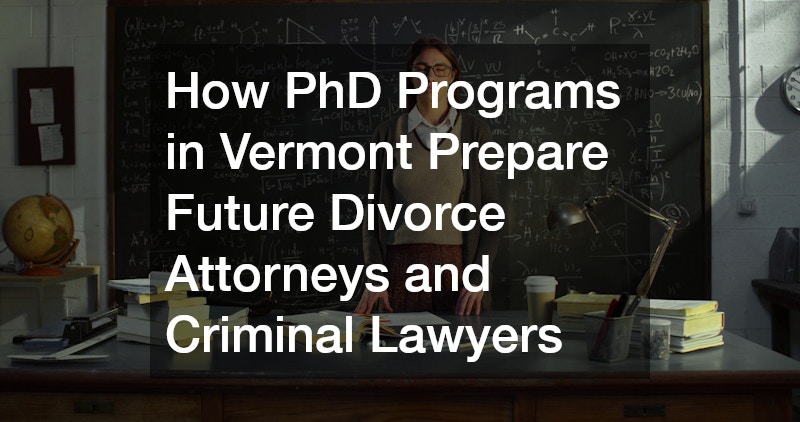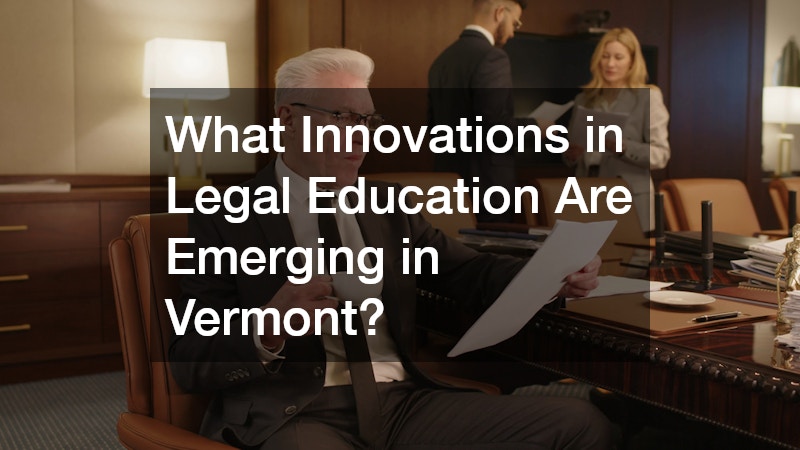
How PhD Programs in Vermont Prepare Future Divorce Attorneys and Criminal Lawyers
Introduction
In the evolving landscape of legal education, Vermont has emerged as a compelling destination for aspiring legal professionals seeking a robust academic foundation. PhD programs in Vermont offer a distinctive blend of theory, practical application, and interdisciplinary collaboration—features especially valuable for those pursuing careers in divorce law and criminal defense. These advanced programs not only sharpen legal acumen but also build the psychological, ethical, and analytical competencies necessary for navigating complex legal cases.
With a growing need for professionals who can approach family and criminal law with both intellectual rigor and human empathy, Vermont’s legal doctoral programs equip graduates to excel in highly nuanced practice areas. Whether someone is seeking to become the best divorce attorney in their community or a strategic and ethical criminal lawyer, these programs create pathways for meaningful and impactful careers.

What Unique Skills Do PhD Programs in Vermont Offer Future Attorneys?
PhD-level legal education in Vermont is deeply rooted in academic excellence and holistic skill development. Unlike traditional law school curricula, these programs prioritize research and interdisciplinary scholarship, giving students tools to become thought leaders and effective practitioners.
Students develop exceptional research and analytical skills through in-depth legal writing, case study evaluation, and policy critique. These skills are crucial for future divorce attorneys who must untangle years of financial entanglements, or for criminal defense attorneys tasked with constructing fact-based arguments under scrutiny.
Legal theory and its real-world application form the backbone of Vermont’s legal education. Students explore constitutional law, procedural justice, and the sociopolitical influences that shape legislative decisions. This understanding is key for those seeking to advance in the criminal law field or provide high-quality representation in divorce proceedings involving child custody and alimony.
Vermont’s programs also emphasize ethical and philosophical perspectives. Through seminars and research opportunities, students are encouraged to reflect on fairness, justice, and professional responsibility—key principles for any estate planning lawyer, supplemental needs trust attorney, or criminal lawyer tasked with guiding clients through some of life’s most difficult decisions.
How Do These Programs Address Specialization in Divorce Law?
PhD programs in Vermont take a multi-dimensional approach to divorce law by drawing on insights from psychology, sociology, and conflict resolution. This interdisciplinary foundation allows students to understand family dynamics and develop legal solutions that prioritize long-term stability for clients.
One area of focus is family law through interdisciplinary approaches. Students study how social services, healthcare systems, and education intersect with divorce law, enabling them to advise clients with a broader understanding of their needs. This approach is especially valuable in high-conflict divorces or those involving children with special needs, where the involvement of a supplemental needs trust attorney might also be necessary.
Mediation and conflict resolution techniques are integrated into coursework, preparing students to handle disputes outside of the courtroom when possible. Future practitioners are trained to defuse hostility and foster compromise—skills that are increasingly demanded of divorce attorneys aiming to preserve family relationships rather than destroy them.
Psychological components in divorce proceedings, including trauma, attachment theory, and mental health evaluation, are also covered. Such knowledge is invaluable for attorneys handling cases involving abuse, parental alienation, or emotionally complex custody battles. The goal is to prepare graduates not only to litigate but also to advocate for their clients’ emotional and psychological well-being.
How Are Criminal Law Specializations in Vermont Developed?
For students aspiring to careers in criminal law, Vermont’s PhD programs offer a rigorous and justice-focused education. Criminal law specializations emphasize a blend of theoretical exploration and practical application, beginning with an understanding of criminal behavior.
Through coursework in criminology, behavioral psychology, and social justice, students explore the roots of criminal activity. This helps future criminal lawyers build more empathetic and effective defense strategies, especially when representing marginalized or misunderstood populations.
Forensic science and the law are another pillar of the curriculum. Students gain hands-on experience with evidence analysis, expert testimony, and crime scene reconstruction. This training is vital for attorneys expected to dissect forensic reports or challenge prosecution claims effectively.
Criminal defense strategies are studied in-depth through mock trials, case simulations, and comparative legal analysis. Students learn how to construct narratives, cross-examine witnesses, and apply constitutional protections to real-world cases. These exercises ensure that graduates are not just well-read but courtroom-ready.
What Are the Admission Requirements for PhD Law Programs in Vermont?
Gaining admission to a PhD program in law or legal studies in Vermont requires a strong academic and professional foundation. Applicants must meet educational pre-requisites, including a completed JD or equivalent degree in legal studies. This requirement ensures that students enter the program with a baseline understanding of the law’s mechanics.
Professional experience—whether in practice, research, or policy—is also valued. Many applicants have worked as paralegals, judicial clerks, or legal researchers. Others come from related fields like social work, education, or public health, which align with the interdisciplinary nature of these programs.
The application process includes the submission of a personal statement, academic transcripts, letters of recommendation, and a writing sample. Deadlines vary by institution, but early submission is encouraged. Competitive applicants often demonstrate an interest in a specific legal issue, such as divorce law reform or criminal justice equity.

How Do Vermont Programs Incorporate Practical Training?
PhD programs in Vermont go beyond theoretical coursework by embedding practical training opportunities into the curriculum. This includes internship and externship opportunities with local law firms, non-profits, and government agencies. Students interested in family law may assist with real divorce proceedings or mediation sessions, while those focused on criminal defense might clerk for public defenders or observe courtroom hearings.
Simulated courtroom experiences further prepare students for litigation. Through moot court competitions and legal argument simulations, students hone their advocacy skills, practice legal reasoning, and receive feedback from experienced professionals. These experiences are invaluable for future attorneys aiming to become the best divorce attorney or a top criminal lawyer in their community.
Legal clinics and workshops provide another layer of training. In these settings, students may represent underserved clients under supervision, gaining real-world experience while helping those who might otherwise go without representation. This community engagement not only enriches learning but also fulfills the ethical mission that many Vermont legal programs uphold.
What Role Does Mentorship Play in These PhD Programs?
Mentorship is a cornerstone of Vermont’s doctoral legal education. Faculty and advisor guidance begins from day one, as students are paired with mentors who align with their academic interests. These mentors provide insight on dissertation development, career planning, and research strategy, ensuring that students stay focused and supported.
Peer support networks foster collaboration and reduce isolation—especially important in demanding PhD environments. Cohort-based learning structures encourage students to share ideas, critique one another’s work, and grow together professionally.
Alumni connections and networking opportunities also play a key role. Graduates of Vermont PhD programs often maintain ties with their alma mater, offering mentorship, job referrals, and even research partnerships. These connections are especially valuable for students interested in competitive roles, whether that’s a position as an estate planning lawyer at a top firm or as a criminal lawyer representing high-profile clients.
How Do Philanthropic Efforts Support These Vermont Programs?
Philanthropy helps ensure that legal education in Vermont remains accessible and innovative. Scholarships and financial aid reduce the financial burden on students and increase diversity within legal academia. Many programs offer funding specifically for those pursuing socially impactful work, including divorce law reform, criminal justice advocacy, and support for underserved families.
Research grants and fellowships provide the resources necessary to undertake original legal research. These funds allow students to publish academic papers, present at conferences, and contribute to evolving legal debates. For students interested in becoming thought leaders in divorce law or criminal defense, these opportunities are career-defining.
Institutional partnerships and funding from local foundations also play a role. Universities in Vermont often collaborate with private schools, test tutors, and non-profits to provide legal education workshops, know-your-rights seminars, and public advocacy training. These initiatives deepen student engagement and ensure a real-world impact.

What Are the Career Outcomes for Graduates?
Graduates of Vermont’s PhD programs enjoy strong employment rates and meaningful career advancement. Whether they join academia, enter public service, or practice law directly, they are well-prepared to contribute in a variety of roles.
Employment trends show growing demand for attorneys with advanced academic training, especially in policy reform, legal consulting, and specialized family and criminal law practices. Vermont PhD graduates are often sought after for leadership roles, such as managing legal clinics or directing advocacy initiatives.
Career advancement opportunities abound, including roles in legal education, judiciary appointments, and law firm leadership. Graduates also transition into roles as senior counsel or consultants for family courts, correctional institutions, or philanthropic organizations.
Alumni success stories include professionals who have become top-tier criminal lawyers in metropolitan areas, led divorce law clinics in rural communities, or helped shape legislation around supplemental needs trusts for families with disabled dependents. These stories underscore the versatility and impact of Vermont’s legal PhD programs.
How Do Vermont PhD Programs Compare to Out-of-State Options?
Compared to out-of-state programs, Vermont’s offerings stand out for their curriculum depth, focus on ethics, and student support. While elite institutions elsewhere may offer broader name recognition, Vermont programs excel in specialization, particularly in family and criminal law.
Curriculum comparisons reveal that Vermont schools prioritize interdisciplinary learning and public service, making them ideal for students who value both academic rigor and community engagement.
Cost and affordability are also key considerations. Vermont programs tend to offer lower tuition than out-of-state private schools while maintaining high academic standards. This makes them attractive options for students coming from both public and private school backgrounds, including those who were supported by test tutors or attended the best private school in their region.
The community and academic environment in Vermont fosters inclusion, sustainability, and collaborative research. Small class sizes, access to faculty, and scenic surroundings create a supportive space for intellectual and professional development.

What Innovations in Legal Education Are Emerging in Vermont?
Innovation is a hallmark of Vermont’s legal education scene. Technological advancements in law are increasingly being integrated into PhD programs, including legal analytics, digital evidence management, and AI-assisted legal research. These tools prepare students for modern legal practice, where technology intersects with every facet of litigation and policy development.
New areas of legal research, such as restorative justice, environmental law, and tech-based privacy rights, are gaining traction. Students are encouraged to explore how emerging social issues intersect with traditional legal frameworks—an approach highly relevant for those interested in criminal defense reform or family justice initiatives.
Collaborative inter-institutional initiatives further drive innovation. Partnerships with medical schools, psychology departments, and public policy institutes enable legal scholars to approach challenges like domestic abuse or juvenile justice from multiple vantage points. These partnerships broaden the scope of traditional legal education and provide tools to better serve clients, whether you’re assisting a divorced parent or advocating for fair sentencing in a criminal case.
Conclusion
PhD programs in Vermont offer an exceptional path for future attorneys who want to specialize in divorce or criminal law. More than just an academic credential, these advanced degrees represent a transformative journey through legal scholarship, ethical practice, and real-world problem-solving. Students are immersed in a rigorous environment that emphasizes both the theoretical foundations of law and its practical, human application. Whether focusing on the emotionally charged terrain of divorce law or the high-stakes landscape of criminal defense, graduates leave Vermont’s programs uniquely equipped to practice with intelligence, empathy, and impact.
The comprehensive nature of these programs is what sets them apart. From intensive legal writing seminars and case law analysis to experiential learning through clinics and externships, every aspect is designed to foster critical thinking and real-world readiness. For those aspiring to be the best divorce attorney in their region, the curriculum covers everything from property division and custody negotiations to mediation strategies and trauma-informed client care. Similarly, future criminal lawyers engage deeply with procedural justice, forensic science, and trial advocacy—skills that are indispensable when lives and freedoms are at stake.
Interdisciplinary study is a hallmark of Vermont’s legal education. Students are encouraged to explore intersections between law and psychology, sociology, public health, and education. This cross-training prepares graduates to tackle complex legal issues with nuance. For example, a divorce attorney working with families from diverse backgrounds or with children requiring special support may benefit from knowledge of supplemental needs trusts and estate planning law. Likewise, a criminal lawyer addressing systemic inequities in sentencing will draw on historical, sociological, and ethical contexts to advocate more effectively.






